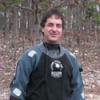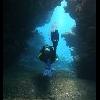
Hot Shower's
#16

Posted 11 October 2004 - 10:00 AM
if your dehydrated, the blood will have a harder time transporting nitrogen from the tissues to the lungs for offgassing.
as far as the warm water rinse on the boat, its not a problem unless your taking forever. the risk comes when you cause a rise in body temp, which isn't gonna happen with a quick openair rinse on the boat deck.
if you want to read a lot more on the subject, there are Docs on one of the other boards who have discussed it at length (ad nauseum).
#17

Posted 11 October 2004 - 10:42 AM
Often times DCS is the result of many contributing factors specific to that person which is why everyone on the dive didn't get DCS from the dive although the dive profiles may have been almost the same: dehydration, lack of sleep, excess body fat, diving with a cold, ascending faster than you realize (regardless of the safety stop), the nitrogen build up from the previous dives that day (thus not paying attention to reduced bottom time limits), and the list can go on. Without having each and every single fact and factor, to blame a hot shower completely for a DCS incident would be to overlook other contributing factors that weigh as important.
Diving in the Pacific Northwest, we are aware of the hot shower/hot tub risk, but often times come out of the water so cold it is hard to not warm yourself in that manner. Keep in mind, it isn't immediate though as travel from the dive site and gear breakdown takes time - so usually there are 1-3 hour windows (or more) after diving before even making it to hot water.
As a woman, I personally add in 1 minute half stops or deep stops as some people call them on deeper dives and stay twice as long at 15' as my male counterparts to be on the safe side. But again, our diving up here is fairly strenuous. I also recommend to my students to do 3 minute safety stops for all dives to 60' and a minimum 5 minute safety stop for all deeper dives. If you have the air, why not? It's not like the ocean quits while you are on a safety stop. You can look somewhere other than your computer or watch and still enjoy your time!
Dive safe!
Once in a while, it is good to step back, take a breath, and remember to be humble. You'll never know it all - ScubaDadMiami. If you aren't afraid of dying, there is nothing you can't achieve - Lao-tzu. One dog barks at something, the rest bark at him - Chinese Proverb.
#18

Posted 11 October 2004 - 11:12 AM
The physiological effect of a hot shower is to dialate the sub cutanious (directly under the skin) capillaries and increasing blood flow to the skin. This would increase N2 elimination from the skin (a possible way to prevent skin bends... maybe).However the blood is diverted from the body core and may decrease bloodflow (and therefore N2 elimination) in other areas. This is why ppl are cautioned from taking a hot shower/bath directly after diving.
A quick 2-3 min rinse of after a dive isnt really a big concern as bloodflow will return to its normal pattern after the skin cools.
The reverse effect, cooling of the skin is a greater concern as this restricts bloodflow to the skin and decreases the N2 elimination. This can happen when surfacing whilst cold or after a dive and get cold. The sub cutanious capillaries are constricted to lessen bloodflow and conserve heat and cant eliminate N2 quickly enough, which normally results in skin bends (visible as a red/brown rash, although wetsuites etc can also leave a rash).
Dehydration is a much bigger concern as it actually lessens the efficiency of the blood to carry away N2 due to the decreased amount of blood plasma during dehydration. This is the main reason divers are advised against sunbathing after diving as it causes water loss and dialates capillaries like a hot shower/bath. Alcohol can also cause major dehydration, along with other dyretics such as coffee.
As Dive_Girl says there are many factors that contribute to the onset of DCS, each to differing degrees depending on the individuals physiology and habits proir to and during the dive.
There is a very good book that talks about many of the contributing factors of DCS - "The Decompression Matrix" by Dr Bob Cole.
Edited by SquattingRadishDM, 11 October 2004 - 11:18 AM.
Ah, sir, live in the bosom of the waters! There alone is independence. There I recognise no masters! There I am free.
Jules Verne. 20,000 Leagues Under The Sea.
#19

Posted 11 October 2004 - 11:36 AM
:lam:
- Albert Einstein
"Do, or do not. There is no 'try'."
- Yoda ('The Empire Strikes Back')
"And the trees are all kept equal by hatch, axe, and saw"
- Rush (The Trees)
#20

Posted 11 October 2004 - 12:27 PM
H20 Bug
Here is a good starting place.
http://www.google.co...x=12&Search.y=4
and this one
https://www.diversal...q.asp?faqid=133
or
http://www.diversale...icles/index.asp
B2B
no trees were harmed while posting any of my messages,
however a significant number of electrons were inconvenienced.
Buy Lawn Mower and Chain Saw Parts at...
Amazon.com
#21

Posted 11 October 2004 - 12:50 PM
Once in a while, it is good to step back, take a breath, and remember to be humble. You'll never know it all - ScubaDadMiami. If you aren't afraid of dying, there is nothing you can't achieve - Lao-tzu. One dog barks at something, the rest bark at him - Chinese Proverb.
#22

Posted 11 October 2004 - 01:55 PM
I copied and pasted this from your link.
Cold water (vasoconstriction decreases nitrogen off-loading). Warm water immersion (vasodilation) and the head down position increases nitrogen elimination.
Heavy work (vacuum effect in which tendon use causes gas pockets). Exercise at depth increases nitrogen uptake and is detrimental.
Rough sea conditions
Heated diving suits (leads to dehydration)
Divers who have been chilled on decompression dives (or dives near the no-decompression limit) and take very hot baths or showers may stimulate bubble formation.
B2B
Disclaimer
The info and links provided here is not entended to scare you away from diving
rather to inform you.
But if you change your mind about diving please send your Bonaire tickets and hotel voucher to me
Edited by Bubble2Bubble, 11 October 2004 - 02:03 PM.
no trees were harmed while posting any of my messages,
however a significant number of electrons were inconvenienced.
Buy Lawn Mower and Chain Saw Parts at...
Amazon.com
#23

Posted 11 October 2004 - 02:53 PM
Such divers would have decreased bloodflow to the skin because of vasoconstriction meaning less N2 is absorbed by the skin and outer tissues during the dive (blood is routed away from the skin to save heat). But would also have increased bloodflow to the body core and therefore increased N2 absorbed into this area. (N2 absorbed into organs not outer skin or fat)Divers who have been chilled on decompression dives (or dives near the no-decompression limit)
After the dive the main bloodflow is now rerouted to the skin (Vasodillation to cool the body) and as such the highly saturated tissues in the body core do not have the bloodflow required to eliminate the N2 from them. Hence the onset of DCS.and take very hot baths or showers may stimulate bubble formation.
Is there a Doctor in the house to back this up? Or is there some mechanism apart from a change in bloodflow that could cause DCS after having a hot shower?
Having just posted a rant in another forum about not believing everything you read in forums THIS IS A THEORY
Ah, sir, live in the bosom of the waters! There alone is independence. There I recognise no masters! There I am free.
Jules Verne. 20,000 Leagues Under The Sea.
#24

Posted 11 October 2004 - 03:16 PM
Theory's are great especially when identified as one. Rants are not! Thanks for your great posts. We do have a doc or two in the house...hopefully they will respond! -wwHaving just posted a rant in another forum about not believing everything you read in forums THIS IS A THEORY
. Feel free to deconstruct it and reassemble into something that fits better.
Contact me directly at Kamala@SingleDivers.com for your private or group travel needs or 864-557-6079 AND don't miss SD's 2018-2021 Trips! ....here! Most are once in a lifetime opportunities...don't miss the chance to go!!
SD LEGACY/OLD/MANUAL Forms & Documents.... here !
Click here TO PAY for Merchandise, Membership, or Travel
"Imitation is the sincerest flattery." - Gandhi
"Imitation is proof that originality is rare." - ScubaHawk
SingleDivers.com...often imitated...never duplicated!
Kamala Shadduck c/o SingleDivers.com LLC
2234 North Federal Hwy, #1010 Boca Raton, FL 33431
formerly...
710 Dive Buddy Lane; Salem, SC 29676
864-557-6079 tel/celfone/office or tollfree fax 888-480-0906
#25

Posted 11 October 2004 - 03:58 PM
#26

Posted 11 October 2004 - 09:10 PM
I am talking about Decompression Sickness, the specific symptoms of which can be found in any open water diving manual or course such as severe pain in the joints, chronic fatigue etc. In this particular case we are dicussing the mechanism that causes DCS after having a hot shower or bath after diving............I'm off to bed after drinking too muchso how do you know when you get this thing? what are the symptoms?
This drunken post is gonna spoil my respectable image
Ah, sir, live in the bosom of the waters! There alone is independence. There I recognise no masters! There I am free.
Jules Verne. 20,000 Leagues Under The Sea.
#27

Posted 11 October 2004 - 09:44 PM
There is a 5 minute Neurological Exam DAN publsihed. I'll try to find it and post it here.so how do you know when you get this thing? what are the symptoms?
The First and Foremost thing you do is avoid it!
(1) Go to bed early and sober, even if you're the only one. In the group; I ofen am.
(2) Stay well hydrated! Avoid Diuretics and "emtpy" Reverse Osmosis bottled water. Your best bet is 2 quarts of sport drink a day. I force msyelf even when not thirsty.
(3) Avoid NDLs on dives!
(4) Slow ascents, with deep stops on deeper dives, long safety stops.
(5) No hot tubs or showers, or strenuous exercise for a few hours afterwards.
Otherwise, for whomever it may apply, never call old flames nor post on a written board when drinking to relaxation.

Yeah I know: I've been branded a non-group person - doesn't play well with others. I am so upset.
 Let me know if you want to have some fun, without the drama - I'm good for that.
Let me know if you want to have some fun, without the drama - I'm good for that.
#28

Posted 11 October 2004 - 10:09 PM
DAN Medical Center
On-Site Neurological Examination
By Ed Thalmann, M.D., Assistant Medical Director of DAN
Information regarding the injured diver's neurological status will be useful to medical personnel in not only deciding the initial course of treatment but also in the effectiveness of treatment. Examination of an injured diver's central nervous system soon after an accident may provide valuable information to the physician responsible for treatment. The On-Site Neuro Exam is easy to learn and can be done by individuals with no medical experience. Perform as much of the examination as possible, but do not let it interfere with evacuation to a medical treatment facility.
Perform the following steps in order, and record the time and results.
1. Orientation
Does the diver know his/her own name and age?
Does the diver know the present location?
Does the diver know what time, day, year it is?
Note: Even though a diver appears alert, the answers to these questions may reveal confusion. Do not omit them.
2. Eyes
Have the diver count the number of fingers you display, using two or three different numbers.
Check each eye separately and then together.
Have the diver identify a distant object.
Tell the diver to hold head still, or you gently hold it still, while placing your other hand about 18 inches/0.5 meters in front of the face. Ask the diver to follow your hand. Now move your hand up and down, then side to side. The diver's eyes should follow your hand and should not jerk to one side and return.
Check that the pupils are equal in size.
3. Face
Ask the diver to purse the lips. Look carefully to see that both sides of the face have the same expression.
Ask the diver to grit the teeth. Feel the jaw muscles to confirm that they are contracted equally.
Instruct the diver to close the eyes while you lightly touch your fingertips across the forehead and face to be sure sensation is present and the same everywhere.
4. Hearing
Hearing can be evaluated by holding your hand about 2 feet/0.6 meters from the diver's ear and rubbing your thumb and finger together.
Check both ears moving your hand closer until the diver hears it.
Check several times and compare with your own hearing.
Note: If the surroundings are noisy, the test is difficult to evaluate. Ask bystanders to be quiet and to turn off unneeded machinery.
5. Swallowing Reflex
Instruct the diver to swallow while you watch the "Adam's apple" to be sure it moves up and down.
6. Tongue
Instruct the diver to stick out the tongue. It should come out straight in the middle of the mouth without deviating to either side.
7. Muscle Strength
Instruct the diver to shrug shoulders while you bear down on them to observe for equal muscle strength.
Check diver's arms by bringing the elbows up level with the shoulders, hands level with the arms and touching the chest. Instruct the diver to resist while you pull the arms away, push them back, up and down. The strength should be approximately equal in both arms in each direction.
Check leg strength by having the diver lie flat and raise and lower the legs while you resist the movement.
8. Sensory Perception
Check on both sides by touching lightly as was done on the face. Start at the top of the body and compare sides while moving downwards to cover the entire body.
Note: The diver's eyes should be closed during this procedure. The diver should confirm the sensation in each area before you move to another area.
9. Balance and Coordination
Note: Be prepared to protect the diver from injury when performing this test.
First, have the diver walk heel to toe along a straight line while looking straight ahead.
Have her walk both forward and backward for 10 feet or so. Note whether her movements are smooth and if she can maintain her balance without having to look down or hold onto something.
Next, have the diver stand up with feet together and close eyes and hold the arms straight out in front of her with the palms up. The diver should be able to maintain balance if the platform is stable. Your arms should be around, but not touching, the diver. Be prepared to catch the diver who starts to fall.
Check coordination by having the diver move an index finger back and forth rapidly between the diver's nose and your finger held approximately 18 inches/0.5 meters from the diver's face. The diver should be able to do this, even if you move your finger to different positions.
Have the diver lie down and instruct him to slide the heel of one foot down the shin of his other leg, while keeping his eyes closed. The diver should be able to move his foot smoothly along his shin, without jagged, side-to-side movements.
Check these tests on both right and left sides and observe carefully for unusual clumsiness on either side.
Important Notes:
Tests 1,7, and 9 are the most important and should be given priority if not all tests can be performed.
The diver's condition may prevent the performance of one or more of these tests. Record any omitted test and the reason. If any of the tests are not normal, injury to the central nervous system should be suspected.
The tests should be repeated at 30- to 60-minute intervals while awaiting assistance in order to determine if any change occurs. Report the results to the emergency medical personnel responding to the call.
Good diving safety habits would include practicing this examination on normal divers to become proficient in the test.
Examination of an injured diver's central nervous system soon after an accident may provide valuable information to the physician responsible for treatment.
The On-Site Neuro Exam is easy to learn and can be done by individuals with no medical experience at all.
And I'll add - when in doubt, activate EMS and let the pros take over. Did this once; decide not to after the exam once.

Yeah I know: I've been branded a non-group person - doesn't play well with others. I am so upset.
 Let me know if you want to have some fun, without the drama - I'm good for that.
Let me know if you want to have some fun, without the drama - I'm good for that.
#29

Posted 12 October 2004 - 11:43 AM
"Love is blind but lust likes lacy panties" -- SanDiegoCarol
"If you're gonna be dumb, you'd better be tough." -- Phillip Manor
"If I know the answer I'll tell you the answer, and if I don't I'll just respond cleverly." -- Donald Rumsfeld
#30

Posted 12 October 2004 - 06:38 PM
It's a risk that comes with the territory. Alot of people posted some good info here and if you follow it you're surely on your way to being a safer diver.
0 user(s) are reading this topic
0 members, 0 guests, 0 anonymous users




















